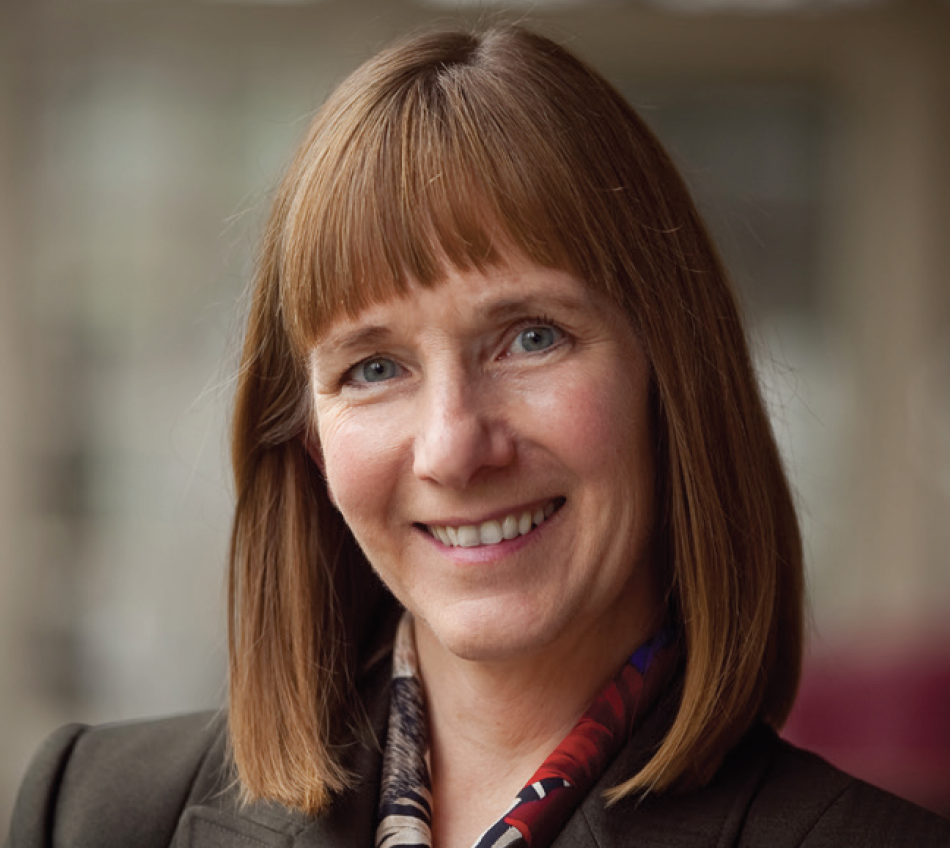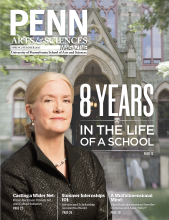Alison Byerly, G’84, GR’89, former Middlebury College Provost and current visiting scholar in literature at the Massachusetts Institute of Technology, has been named the first female president of Lafayette College. We sat down with Byerly to discuss her experience at Penn, her work at Middlebury, and her big transition. Just how does a new college president balance scholarly interests with the demands unique to the job?
Q: Tell me about your time at Penn.
Byerly: I was very well served by the graduate program in English, and throughout my career I have remained very grateful for the excellent fellowship support I received. My major field was Victorian literature; I worked with Elaine
Scarry, Nina Auerbach, and many other terrific faculty members. The program emphasized preparation for a wide range of different professional environments; it provided extensive teaching experience and really encouraged you to do things like get out and give conference papers and turn them into articles. My mother also has a Ph.D. in English from the University, so she had been in the same program years before. There were one or two faculty members at that time who still remembered her, and she certainly was an inspiration to me. So it felt nice to follow in her footsteps.
Q: What were some of the initiatives you oversaw as Middlebury College Provost?
Byerly: In my time at Middlebury, one of the things I was most interested in was figuring out which institutional structures help support and encourage innovation. I think sometimes in higher education you hear administrators and boards talk about faculty as being unwilling to change or being reluctant to embrace new ideas, but individual professors are very creative when it comes to their own classes. So I put together high-level task forces involving large numbers of faculty to engage in discussions about ways in which we could encourage innovation at an institutional level.
Q: You wrote an article for Inside Higher Ed that discussed ways in which university course evaluation systems might be revised. What solutions did you offer?
Byerly: I thought it would be beneficial to allow for faculty to have the opportunity to collect a set of course evaluations but not have them count if they’re teaching a new course for the first time. It doesn’t mean that we take teaching any less seriously because we don’t use course evaluations in our reviews. It means that, if you’re teaching a new course, you could ask to simply have that set of evaluations not put in your review file. I think the academic profession doesn’t really encourage risktaking. It’s very structured. It encourages people to play by the rules. And there are moments when I think you can take a step forward a little bit more easily if you stretch those structures a little bit.
Q: You have maintained a role as an educator and scholar. How do you balance these undertakings with your administrative duties?
Byerly: As the provost, it was important to try to maintain both a teaching persona and a scholarly profile. I’ve been fortunate to have the opportunity to go on sabbatical even while serving in the administration. My book that just came out, Are We There Yet? Virtual Travel and Victorian Realism, combines my interest in Victorian literature with my interest in media studies. It explores affinities between realism in the 19thcentury novel and contemporary ideas about virtual reality. That led me in the direction of looking carefully at technology issues, particularly in how they affect higher education in general. I also wanted to make sure I continued to teach at least one course a year. I found that it was a terrific way to stay in touch with students. It’s very easy when you’re an administrator to see only the students who are excelling or who are student government heads, but not really have a feel for the student body as a whole.
Q: What do you foresee as your first major initiative as president of Lafayette?
Byerly: My own interest in technology could certainly be helpful to the discussions they are currently having about how to integrate the engineering and technology aspect of their curriculum with the liberal arts dimension of their curriculum. They’re unusual among liberal arts colleges in that they have an engineering division as well as the traditional liberal arts disciplines. At a time when many liberal arts colleges are trying to define the role of technology, that’s a real strength. I also think that looking carefully at the role of residential life in an undergraduate college is really critical these days. It’s often seen as secondary to the academic program, but I think the two pieces complement each other in important ways. With new opportunities for online education emerging, and concern about rising tuition costs, it’s going to be increasingly important for undergraduate colleges and liberal arts colleges to make the case for how the residential experience complements the academic experience in contributing to holistic growth of students.




